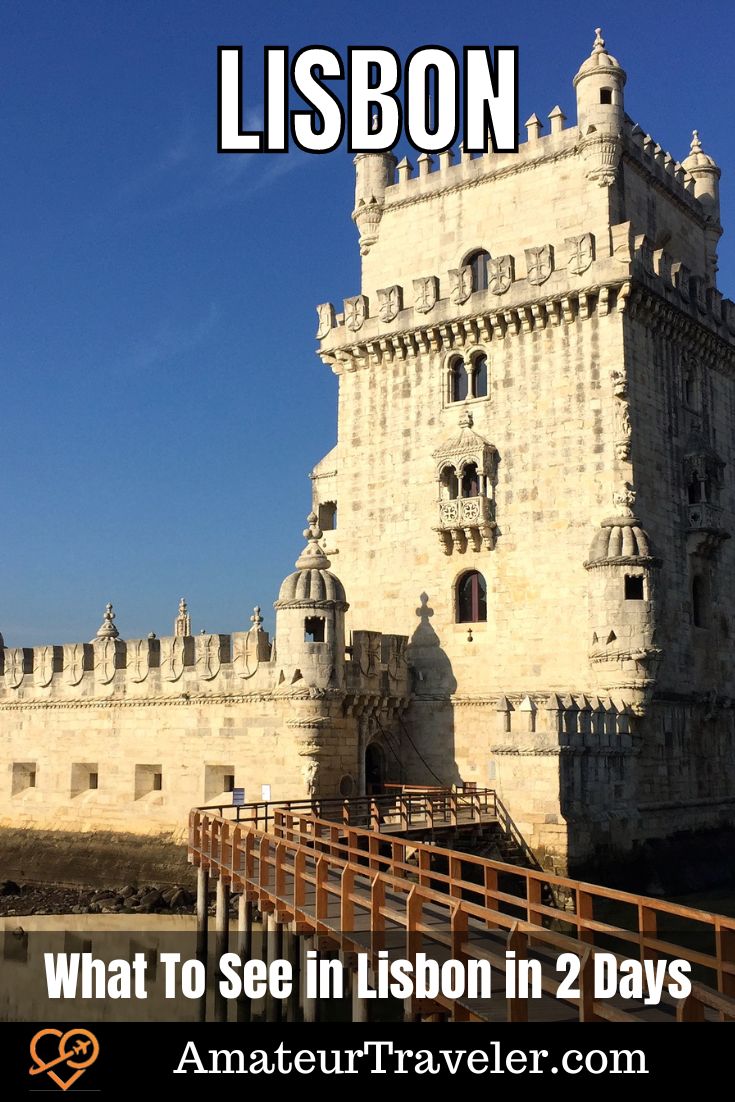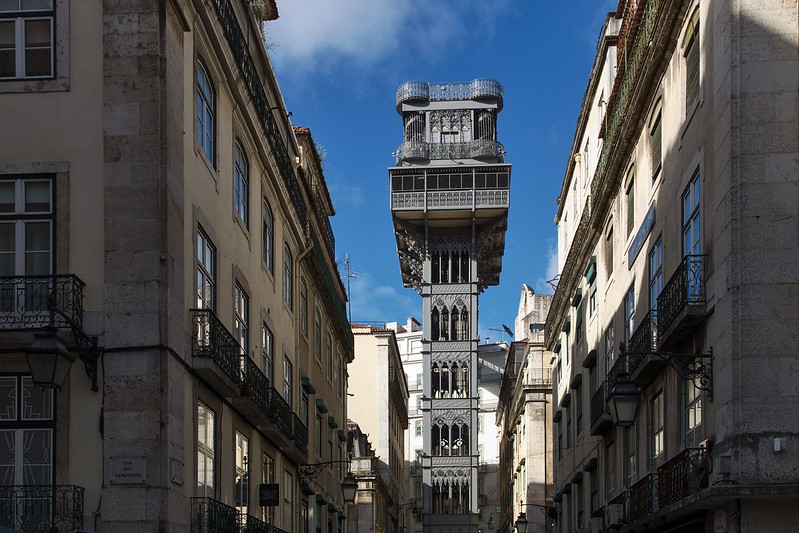What To See in Lisbon in 2 Days

Table of Contents

View from São Jorge Castle
Portugal, part of the Iberian Peninsula, is a small western European country founded in 1143. Travelers from across the globe visit for the architecture, history, beaches, and affordability. A lot of people don’t think of Portugal as part of their planned European tour, but that’s really too bad. Here at Amateur Traveler, we think Portugal should be on everyone’s shortlist.
Whether you’re traveling throughout the country, popping over from Spain for a couple of days, or having an unexpected layover, there are a lot of must-see places in Lisbon. The third-largest city on the Iberian Peninsula, Lisbon is a modern metropolis with incredible history and rich culture.
Every traveler is different – some of us enjoy long meals, local haunts, and late-night cocktails (me!) and some prefer waking up early, seeing everything there is to see, and focusing on the history. This list includes the top attractions in Lisbon, so you can choose what suits your travel style best. No matter where you end up, you’re sure to find a lot to love about Lisbon.

Table of contents: ()

Baixa & Rossio
The Baixa district is at the heart of Lisbon and is an area made up of three lively city squares: King Pedro IV Square (Praça Dom Pedro IV), Fig Tree Square (Praça de Figueira), and Palace Yard (Terreiro do Paço). It is a great place to visit on a long layover to stretch your legs, and all you really need to do is show up with your walking shoes. You’ll stumble upon countless things to see, do, and eat. The homes are beautiful, many with painted stucco and clay tile roofs.

Commerce Square (Praça do Comércio)
Another square in Baixa, this particular one has a lot of unique history. Commerce Square was built on the ruins of the royal palace that was destroyed in the 1755 earthquake. The construction of the site included revolutionary urban planning with buildings designed to resist future seismic activity.
The Elevador de Santa Justa
This is a great attraction, but only if you’re comfortable with heights. Dating back to the Industrial Age, this lift carries sight-seers up one of Lisbon’s steepest hills. While the views outside are stunning, you’ll also be wowed by the brass, iron, and wooden details of the lift’s cabin. Tickets cost about USD $5.50, but the panoramic views are worth every penny.
Rua Augusta
One of the main streets in Baixa, Rua Augusta is a great place to find a cafe where you can enjoy an authentic lunch. Unique to Rua Augusta, the streets are covered in beautiful mosaics. I recommend checking out the terrace atop the Augusta Arch for some stunning views of Lisbon’s central business district.
Rossio
On the northern end of Baixa, Rossio is considered the heart of the city. King Pedro IV Square is the pillar of this neighborhood, surrounded by cafes, bars, and shopping. Rossio is filled with activity at all times and is a great place to explore in the morning or afternoon. You can take a pleasant walk from Rua Augusta to Rossio along the Tagus River.

Belém
Situated along the Tagus River, the Belém district is known for its seafaring past and historical monuments. Belém is definitely worth your time. A half day will be enough for most visitors, but if you’re especially fond of unique history or want to visit more than one museum, you may spend longer here.
National Coach Museum (Museu Nacional dos Coches)
This is a great spot for those who enjoy automotive or quirky history. This museum houses horse-drawn carriages from the 17th, 18th, and 19th centuries. Tickets cost about USD $8.50, so it’s an inexpensive way to see some unique history.

Belém Tower (Torre de Belém)
A personal favorite, the Tower of Saint Vincent is a 16th-century fortification that served as a ceremonial entrance to Lisbon as well as the point of departure and arrival for many famous expeditions. A UNESCO World Heritage Site, Belém Tower is a must-see for history buffs, site seers, and photographers.

Jerónimos Monastery (Mosteiro dos Jerónimos)
A former monastery, this attraction dates back to the 1500s. It was erected near the launch point of Vasca da Gama. The monastery is a beautiful example of Manueline architecture and is distinguished as a UNESCO World Heritage Site. The monastery houses a maritime museum (Museu de Marinha) and is adjacent to the archeology museum (Museu de Nacional Arqueologia). This is one of the most popular tourist destinations in Lisbon, so you may want to buy tickets ahead of time.
Alfonso de Albuquerque Square (Praça Alfonso de Albuquerque)
This square is home to a bronze statue of Alfonso de Albuquerque which was designed in the neo-Manueline style and inaugurated in 1902. From the square, you can take in great views of Belém Palace, the current residence of the President of Portugal. The palace was built in the 18th century and has had many important uses throughout the centuries. While the square may not be worth a trip to Belém all on its own, its proximity to the area’s other attractions makes it a worthy sojourn.

Alfama
The oldest neighborhood in Lisbon, the Alfama district is home to Miradouro das Portas do Sol, which is one of the most iconic views in all of Portugal. The streets are steep, so you may want to consider the feasibility of walking through Alfama if you have any mobility limitations. Many people enjoy taking the No. 28 Tram, which travels through the district up to São Jorge Castle.

São Jorge Castle (Castelo de São Jorge)
This 11th-century castle is the highlight of Alfama. Sitting at the highest point in Alfama, the castle offers stunning views of Lisbon as well as the Tejo Estuary. If you choose to go inside, you can expect to spend about an hour and a half touring the exhibits. Tickets cost about USD $10.50, but there are discounts for children and students.

Lisbon Cathedral (Sé de Lisboa)
Built in the 12th century, the Cathedral of Saint Mary Major is the most important religious site in Lisbon. Tickets to enter will cost about USD $5 for adults, and less for children. Depending on the timing of your visit, you can also gain entry to the cloister and treasury, wherein you can see various relics and artifacts dating as far back as the Roman era.
National Pantheon
Deemed the National Pantheon in 1916, construction on this building began in 1682 and wasn’t officially finished until 1966. The fabled history of this building is fascinating, even to those of us who aren’t exactly history buffs. On Tuesdays and Saturdays, you can also walk through the Alfama flea market which occurs in the monument’s shadow.
Park of Nations
Park of Nations (Parque das Nações) is a neighborhood in Lisbon that was established in honor of the Expo 98 World’s Fair. This region of Lisbon brings modernity to the storied history of Portugal. You’ll find a large shopping mall, countless bars, and cafes, as well as parks and pedestrian areas.
Water Gardens (Jardim das Águas)
Spotted with waterfalls, stepping stones, towering trees, estuaries, and green spaces, this is one of the most beautiful parks in Lisbon. The Water Gardens sit alongside the Tagus River and offer stunning views of the Vasco da Gama Bridge. Instead of just sitting in the gardens, I recommend taking a cable car ride (Telecabine Lisboa) which gives you a view of the entire area.
Lisbon Aquarium (Oceanário de Lisboa)
The second-largest aquarium in Europe, the Lisbon Aquarium is a great way to spend a few hours, especially if you’re traveling with kids (or are a kid at heart). At about USD $25 a ticket, this is likely the most expensive attraction you might choose to visit. But with special attractions and exhibits dedicated to temperate, tropical, and cold waters, you’ll see more at this aquarium than many others.
Vasco da Gama Bridge
Depending on how you get to the Park of Nations, you might traverse the Vasco da Gama Bridge on your way in. This cable-stayed bridge is again the longest in Europe at nearly 11 miles (it was temporarily bested by the Crimean Bridge). There isn’t really anything to do at the bridge, but it is a sight to behold.

Figueira Square
A Few Niche Ideas
Portugal is filled with unique places and experiences–some of which are totally worth going out of your way for. We’ve broken down the must-see sites by geography, but here are a few more ideas based on what may interest you.
The Bertrand Bookstore (Livraria Bertrand)
First opened in 1732, Bertrand Bookstore is the oldest operating bookstore in the world. The store consists of several vaulted rooms and a cafe in the back, and all purchases come with a stamp proving you purchased it at the world’s oldest bookstore. Located on the main street in Chiado, Bertrand Bookstore is about a 10-minute walk from the center of Baixa.
Bacalhau
With a short amount of time in a city, it can be tempting to forgo sit-down meals and opt for something quicker. However, experiencing a culture includes experiencing the food. Bacalhau, dried and salted cod, is the national dish, and while it can be prepared countless different ways, I recommend trying it at Grelha do Carmo near Rossio. If it suits you, ask for a glass of the local white wine too.

Port Wine Tasting
Even if you can’t make it to Porto, you can still enjoy the famous wines of Portugal here in Lisbon. Wine Room Lisboa is located in Ajuda and is known for its variety of Portuguese wines and traditional snacks. In addition to the wine room, Adjua is home to botanical gardens and a former royal palace.
Pink Street (Rua Nova do Carvalho)
Lisbon’s former red-light district, Pink Street is now famous for its bars and nightlife. Located in the Cais do Sodre neighborhood, this attraction is easily accessible from all of Lisbon. If you want to take in the sites, visit early in the day. However, if you want to go dancing or try a craft cocktail, visit after dinner.
Algés Beach
Reachable by public transport, Algés Beach is calm, quiet, and a perfect place to soak up some sun. The waters are warm and the surf is calm as this beach is on the Tagus River as opposed to the ocean. There are lots of cafes and restaurants in town, so you can easily enjoy breakfast or lunch along with time on the sand.
Pasteis de Nata
With a flaky crust and custard filling, you will want to try this national specialty early in the morning. That way you can stop by for another and another throughout your stay. These egg tart pastries can be found at pretty much any cafe or bakery. I recommend trying one with a dusting of cinnamon and powdered sugar! If you visit Belém, Pastéis de Belém is the best place to try these treats–but get there early because they tend to sell out.

Getting Around
I recommend checking out the Lisbon Card. This pass allows you unlimited access to trams, trains, and buses for 24 to 72 hours, as well as entry to many tourist attractions, including most of those noted in this list. Many European cities offer a similar option, and I’ve found it to be a very stress-free and economical way to travel.
One of my favorite things to do in any city is just wander. Lisbon is considered very safe, even for solo travel, and you never know what you’ll find just by meandering. No matter who you’re with or how much time you have, you’ll be dazzled by Lisbon’s history, culture, and beauty. And, truth be told, you’ll probably end up wishing you had two weeks, not just two days.



